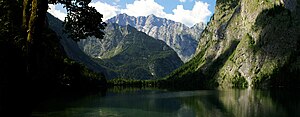Bavaria


Bavaria, officially the Free State of Bavaria, is a state in the southeast of Germany. With an area of 70,550.19 km2 (27,239.58 sq mi), it is the largest German state by land area, comprising roughly a fifth of the total land area of Germany, and with over 13.08 million inhabitants, it is the second most populous German state, behind only North Rhine-Westphalia; however, due to its large land area, its population density is below the German average. Major cities include Munich (its capital and largest city, which is also the third largest city in Germany), Nuremberg, and Augsburg.
The history of Bavaria includes its earliest settlement by Iron Age Celtic tribes, followed by the conquests of the Roman Empire in the 1st century BC, when the territory was incorporated into the provinces of Raetia and Noricum. It became the Duchy of Bavaria (a stem duchy) in the 6th century AD following the collapse of the Western Roman Empire. It was later incorporated into the Holy Roman Empire, became the independent Kingdom of Bavaria after 1806, joined the Prussian-led German Empire in 1871 while retaining its title of kingdom, and finally became a state of the Federal Republic of Germany in 1949.
Bavaria has a distinct culture, largely because of its Catholic heritage and conservative traditions, which includes a language, cuisine, architecture, festivals and elements of Alpine symbolism. It also has the second-largest economy among the German states by GDP figures, giving it the status of a wealthy German region.
Contemporary Bavaria also includes parts of the historical regions of Franconia and Swabia, in addition to Altbayern. (Full article...)
Selected article

The House of Wittelsbach (German: Haus Wittelsbach) is a former Bavarian dynasty, with branches that have ruled over territories including the Electorate of Bavaria, the Electoral Palatinate, the Electorate of Cologne, Holland, Zeeland, Sweden (with Swedish-ruled Finland), Denmark, Norway, Hungary, Bohemia, and Greece. Their ancestral lands of Bavaria and the Palatinate were prince-electorates, and the family had three of its members elected emperors and kings of the Holy Roman Empire. They ruled over the Kingdom of Bavaria which was created in 1805 and continued to exist until 1918.
The House of Windsor, the reigning royal house of the British monarchy, are descendants of Sophia of Hanover (1630–1714), a Wittelsbach Princess of the Palatinate by birth and Electress of Hanover by marriage, who had inherited the succession rights of the House of Stuart and passed them on to the House of Hanover. (Full article...)
Selected biography

Quotes
- Home is not where you live, but where they understand you.
Christian Morgenstern (poet)
- So certainly, if we can tell evil stories to make people sick, we can also tell good stories that make them well.
Rainer Werner Fassbinder (film director)
- Hopefully it won't be worse than it is already.
Selected image

Did you know?

- ...that there is a Bavarian citizenship (as opposed to a German citizenship)? Actually, the Bavarian constitution (Bavaria has a separate constitution that exists alongside the German constitution) explicitly provides for it in articles 6 and 7. Specifically, you become a Bavarian citizen by birth, by marriage or by being naturalized.
Subcategories
Topics
Related portals
Germany state portals
WikiProjects
Things to do

- Requested articles:
- Help assess articles supported by WikiProject Bavaria
- Help suggest content for usage in this portal by using the archive links to obtain instructions
- Write Bavarian topics if you see a redlink which is worthy of an article
- Cleanup and expand stub-class articles relating to Bavaria
Wikipedia in Bavarian languages
Associated Wikimedia
The following Wikimedia Foundation sister projects provide more on this subject:
-
Commons
Free media repository -
Wikibooks
Free textbooks and manuals -
Wikidata
Free knowledge base -
Wikinews
Free-content news -
Wikiquote
Collection of quotations -
Wikisource
Free-content library -
Wikiversity
Free learning tools -
Wikivoyage
Free travel guide -
Wiktionary
Dictionary and thesaurus











